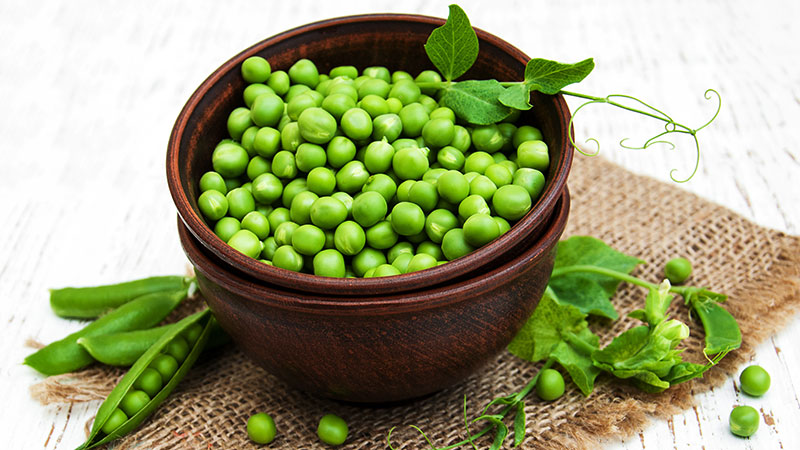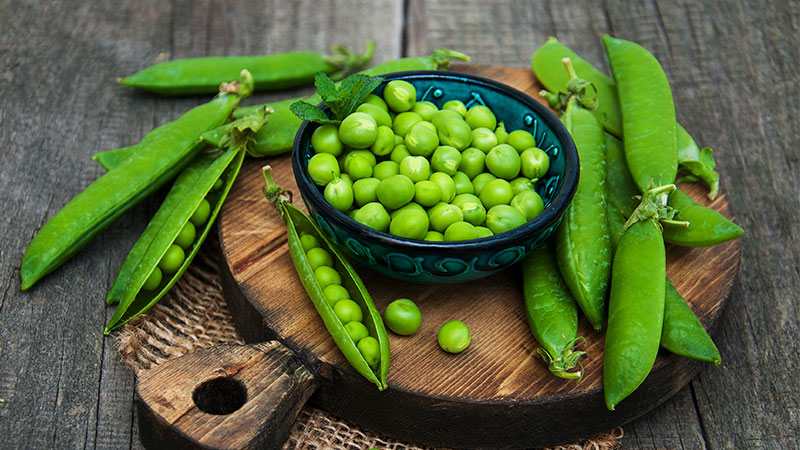
Peas might be small, but don’t let their size fool you—these little green powerhouses pack a punch when it comes to health benefits.
Often mistaken for mere vegetables, peas belong to the legume family, which means they’re related to other nutritional heavyweights like lentils and beans.
With their rich content of protein, fiber, vitamins, and minerals, peas are like nature’s multivitamin, all wrapped up in a cute, green package.
1. Nutrient-Dense
Peas are loaded with essential nutrients. They contain vitamins A, C, K, and B-complex vitamins. By offering a rich supply of minerals like iron, zinc, magnesium, and potassium, peas support immune function.
These nutrients play critical roles in promoting energy production, which is vital for daily activities.
Packed with vitamins and minerals, peas contribute significantly to overall health. Peas aren’t just a great source of fiber and protein; they excel in providing the body with key nutrients.
2. High in Fiber
Peas rank highly as an excellent source of dietary fiber. Each cooked cup of peas provides an impressive 8.8 grams of fiber, contributing significantly to the recommended daily intake of 25–38 grams for adults.
High-fiber diets lower colon cancer risk by up to 21% and aid in weight management, with studies showing fiber is a primary predictor of weight loss in 345 participants over six months.
Fiber enhances digestive health by improving bowel regularity and maintaining a healthy gut microbiome. Also, it reduces heart disease risk by helping eliminate bad cholesterol.
3. Supports Healthy Weight Management
Peas contain low calories and high fiber, making them beneficial for weight management. The fiber increases satiety, helping individuals feel full longer and reducing calorie intake.
This natural fullness can aid in preventing overeating and supporting weight loss. Consuming peas regularly may help maintain a balanced diet by moderating hunger.
Integrating peas into meals as a fiber-rich component contributes to overall calorie control, aligning with weight management efforts effectively.
4. Strengthens Immune System
Peas are packed with antioxidants like flavonoids and carotenoids, which shield cells from free radical damage. Their potency lies in reducing inflammation and preventing oxidative stress, conditions that can weaken immune responses over time.
Over 13% of daily vitamin C needs are covered by a serving of peas, crucial for bolstering immunity.
Also, these green legumes offer vitamin E, zinc, and phenolic acids, further enhancing the body’s ability to fight infections. Peas’ comprehensive nutrient profile makes them a valuable ally in maintaining a robust immune system.
5. Promotes Heart Health
Potassium in peas regulates blood pressure by counteracting sodium effects. This mineral relaxes blood vessels, reducing hypertension risk.
Fiber in peas helps manage cholesterol levels. By lowering bad cholesterol, fiber supports cardiovascular health.
These heart benefits combine to decrease heart disease risk. Nutrients in peas like magnesium and vitamin K also contribute to heart function.
They enhance overall cardiovascular well-being. Peas, nutrient-rich and heart-friendly, make a valuable addition to a heart-healthy diet.
6. Aids Blood Sugar Regulation
Peas excel in aiding blood sugar regulation. As a low glycemic index food, they promote a gradual rise in blood sugar levels.
The fiber in peas slows glucose absorption, providing a steady energy release. Peas also contain protein, which further aids in balancing sugar levels. Individuals with diabetes find peas beneficial due to these properties.
By integrating peas into meals, those at risk of diabetes achieve better glucose management. Consistent consumption helps regulate blood sugar naturally, making peas a valuable addition to a diabetes-friendly diet.
7. Supports Bone Strength
Peas enhance bone health by providing a rich source of vitamin K. This nutrient aids in synthesizing a protein crucial for bone strength.
Regular pea consumption may improve bone density, helping reduce fracture risks, particularly in older adults.
It’s particularly valuable for maintaining bone integrity as part of a balanced diet. Vitamin K supports bone mineralization, enhancing overall skeletal function.
Eating peas regularly contributes essential nutrients, reinforcing bone structure and resilience. By adding peas to meals, individuals support their bone strength naturally and effectively, promoting long-term health benefits.
8. Enhances Eye Health
Peas contain lutein and zeaxanthin. These antioxidants protect eye health by filtering harmful blue light. Consuming these compounds reduces risks associated with age-related macular degeneration.
Cataracts, often causing vision loss in older adults, are less likely to develop with these nutrients. Including peas in diets offers various health benefits. Lutein and zeaxanthin play a vital role in maintaining eye health.
They support clear vision and long-term ocular well-being. Regular pea intake contributes to improved visual function. This dietary choice promotes sustained eye protection naturally.
Ways to Incorporate Peas into Your Diet
Peas offer diverse preparation methods, making them a flexible addition to meals. Their adaptability makes it easy to enjoy their nutritional benefits.
Fresh, Frozen, or Canned?
Peas come in fresh, frozen, or canned options, each with its own merits. Fresh peas are perfect in spring and early summer when they’re in season at local markets.
These are ideal for those preferring a crisp texture and vibrant taste. Frozen peas are picked and frozen at peak ripeness, preserving their nutrients and flavor, making them a convenient year-round choice.
Canned peas, while potentially having added salt, maintain their nutritional content and are an excellent pantry staple for quick meal preparation.
Creative Recipes with Peas
Peas enhance a variety of dishes across cuisines. In traditional pea soup, blending cooked peas with vegetable broth and herbs creates a comforting meal.
Summer gatherings benefit from minted peas; simply toss cooked peas with fresh mint, olive oil, and salt for a refreshing side.
Pea guacamole offers a twist on the classic dip, enriching both flavor and nutrition. Peas seamlessly integrate into stir-fries and curries, complementing other vegetables and proteins.
For a unique touch, mash peas with olive oil and salt for a spread on crusty bread or as a sandwich alternative to mayo.
Potential Side Effects of Peas

Peas, though healthy and nutritious, might cause a few side effects for some individuals. Understanding these potential issues ensures a balanced consumption.
Bloating and Gas
Eating peas can lead to bloating and gas for some people. Peas contain FODMAPs, a carbohydrate group that might escape digestion and get fermented by gut bacteria.
This fermentation process produces gas, contributing to discomfort. Limiting large servings could help those who experience these issues.
Increased Uric Acid Levels
Peas are relatively high in purines, compounds that can increase uric acid levels. For individuals prone to gout or kidney stones, consuming significant amounts may exacerbate these conditions. Monitoring intake and consulting healthcare professionals can aid in managing this risk.
Weight Gain
While usually supportive of weight management, consuming peas in excessive quantities with calorie-rich preparations might contribute to weight gain.
Combining peas with low-calorie ingredients helps maintain their benefits without adding extra caloric load to the diet.
Nutritional Deficiencies
Antinutrients in peas might hinder nutrient absorption. However, these effects predominantly concern individuals consuming large quantities of legumes. Incorporating a variety of foods can counteract potential deficiencies, ensuring a broader nutrient intake.
Allergic Reactions
Some individuals might experience allergic reactions to peas, such as itching or swelling. Although such cases are rare, those with legume allergies should remain cautious. Identifying and avoiding triggers supports overall health and safety.
